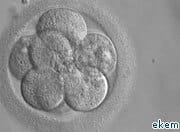The UK Government’s plan to allow the genetic modification of babies has been criticised in an article published by a leading international science journal.
Nature, a prominent science periodical, published an article saying the proposals crossed “a legal and ethical line” and were “premature and ill-conceived”.
The article was written by Marcy Darnovsky, head of the Center for Genetics and Society in California – a public affairs group that encourages responsible use of human genetic technologies.
Controversial
In June, the Government gave its support to a controversial technique which uses IVF to take genetic material from three or four adults to create an embryo.
But Marcy Darnovsky said the entire international community holds that genetic-engineering tools “should not be used to modify gametes or early embryos and so manipulate the characteristics of future children”.
She also pointed out that many secular scientists and bioethicists have voiced “grave and detailed concerns” about the safety of the technique, and about allowing the “intentional genetic modification of children and their descendants”.
Disease
Supporters of the technique say it will help avoid mitochondrial disease, which is passed on from mother to child.
Marcy Darnovsky said the “significant majority” of cases of the disease would not be helped by allowing the creation of three parent embryos.
She argued that the technique could result in putting a “high-tech eugenic social dynamic into play”.
Regulations
The Government is expected to issue draft regulations for consultation later this year. Parliament will then debate a final version next year.
In March, Professor Lord Robert Winston warned that rapid advances in genetic technologies might lead to a form of child “eugenics”.
In a lecture at the Roslin Institute in Edinburgh, he said that current controls will not be able to keep pace, and people could want to modify their children to enhance desirable characteristics.

